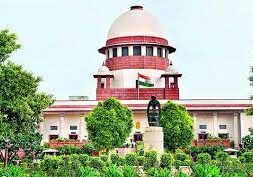
Manas Dasgupta
NEW DELHI, Oct 21: The Supreme Court on Friday strongly reprimanded the governments at the centre and the states for the growing hate speeches in the country and directed the authorities to register suo motu case against such offenders without waiting for a compliant to be filed.
A division bench of Justices K.M. Joseph and Hrishikesh Roy ordered that any “hesitation” to comply with the direction would attract the proceedings for contempt of the Supreme Court against the erring officers. The court directed that FIRs should be registered and criminal proceedings initiated against the makers of hate speech and doers of communal violence “irrespective of their religion so that the secular character of the country is preserved.”
“This is the 21st century. Where have we reached in the name of religion?” the court said, hearing a petition on hate speeches and directing authorities to act against such instances by themselves or face contempt charges. “Contempt will be initiated if the authorities fail to act,” the court said.
It said the state of affairs in India was “shocking for a country that is supposed to be religion-neutral.” “The Constitution of India envisages a secular nation and fraternity among citizens assuring the dignity of the individual…The unity and integrity of the nation is one of the guiding principles enshrined in the preamble,” the judges said.
The Supreme Court strong observations came two days after the visiting United Nations Secretary-General Antonio Guterres criticised India over its human rights record and growing hate speeches. “The petitioner points out [that] despite various penal provisions, no action has been taken and there is a need to serve constitutional principles. We feel this court is charged with a duty to protect the fundamental rights and also protect and serve the constitution where the rule of law is maintained,” they added.
On Thursday, the Supreme Court had sought responses from the centre and the states to a plea requesting an urgent intervention to stop the “growing menace of targeting and terrorising (of) the Muslim Community in India.” Action to be taken irrespective of religion of the maker of the speech or person who commits the act so that secular character envisaged by the Preamble is preserved.
Petitioner Shaheen Abdullah had asked the top court to direct the centre and states to initiate credible probes into the incidents of hate crimes and hate speeches across the country. Senior advocate Kapil Sibal, appearing for the petitioner, presented a recent “Hindu Sabha” as an example where BJP MP from West Delhi, Parvesh Verma, called for the “total boycott” of “these people” in a hard-to-miss reference to Muslims. The judges also read comments by another speaker at the event, Jagat Guru Yogeshwar Acharya, who urged attendees to “slit the throats” of anyone who “raises a finger at our temples. “The interim directions were primarily for the benefit of the police of Delhi, Uttar Pradesh and Uttarakhand.
The court, in its order, said, “The Constitution envisages Bharat as a secular nation and fraternity assuring the dignity of the individual and unity and integrity of the country is one of the guiding principles enshrined in the Preamble”. It said there cannot be fraternity unless members of the different communities and castes were able to live in harmony.
“We feel that this court is charged with the duty to protect these fundamental rights and also protect and preserve the constitutional values, in particular the rule of law and secular and democratic character of the nation,” Justice Joseph read out from the order.
“We are deeply, deeply obliged,” senior advocate Kapil Sibal, appearing for petitioner Shaheen Abdulla, reacted to the order. “We are doing far too little,” Justice Joseph replied. “At least somebody has listened,” Mr. Sibal said. “We have to… it is our duty. If we don’t, it is plain abdication of duty, nothing else to that… Otherwise, what will happen after sometime,” Justice Joseph told Mr. Sibal.
The Bench heard the case beyond court hours and ensured that the order was ready and read out loudly in open court. The petitioner had highlighted the rising incidents of hate speeches targetting the Muslim community. The petitioner said the “total inaction” on the part of the police in the three States have given rise to “despondency and angst” within the Muslim community. The petitioner alleged that events organised in Delhi and Haridwar in 2021 hosted hate speeches by leaders who made open calls for the genocide of Muslims. “These events are happening everyday,” Mr. Sibal said.
In his petition, Mr Abdullah has also sought invoking the tough anti-terrorism law Unlawful Activities Prevention Act (UAPA) and other stringent provisions to curb hate crimes and hate speeches. He said the Muslim community is being “targeted and terrorised” by the participation of the members of the ruling political party in delivering the hate speeches.
The hearing came two days after Antonio Guterres red-flagged growing hate speeches in the country in a rare rebuke. “As an elected member of the Human Rights Council, India has a responsibility to shape global human rights, and to protect and promote the rights of all individuals, including members of minority communities,” Mr Guterres said in a speech in Mumbai.
Though he praised India’s achievements 75 years after leaving British rule, Mr Guterres also said that the understanding that “diversity is a richness… is not a guarantee”. Citing Mahatma Gandhi and Jawaharlal Nehru, Mr Guterres said their values need to be guarded by “condemning hate speech unequivocally.” India must do this “by protecting the rights and freedoms of journalists, human rights activists, students and academics. And by ensuring the continued independence of India’s judiciary”, he said, adding that “much more needs to be done to advance gender equality and women’s rights”.
















